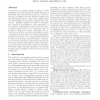Free Online Productivity Tools
i2Speak
i2Symbol
i2OCR
iTex2Img
iWeb2Print
iWeb2Shot
i2Type
iPdf2Split
iPdf2Merge
i2Bopomofo
i2Arabic
i2Style
i2Image
i2PDF
iLatex2Rtf
Sci2ools
SDM
2007
SIAM
2007
SIAM
Flexible Anonymization For Privacy Preserving Data Publishing: A Systematic Search Based Approach
k-anonymity is a popular measure of privacy for data publishing: It measures the risk of identity-disclosure of individuals whose personal information are released in the form of published data for statistical analysis and data mining purposes(e.g. census data). Higher values of k denote higher level of privacy (smaller risk of disclosure). Existing techniques to achieve k-anonymity use a variety of “generalization” and “suppression” of cell values for multi-attribute data. At the same time, the released data needs to be as “information-rich” as possible to maximize its utility. Information loss becomes an even greater concern as more stringent privacy constraints are imposed [4]. The resulting optimization problems have proven to be computationally intensive for data sets with large attribute-domains. In this paper, we develop a systematic enumeration based branchand-bound technique that explores a much richer space of solutions than any previous method in literature. We ...
| Added | 30 Oct 2010 |
| Updated | 30 Oct 2010 |
| Type | Conference |
| Year | 2007 |
| Where | SDM |
| Authors | Bijit Hore, Ravi Chandra Jammalamadaka, Sharad Mehrotra |
Comments (0)

